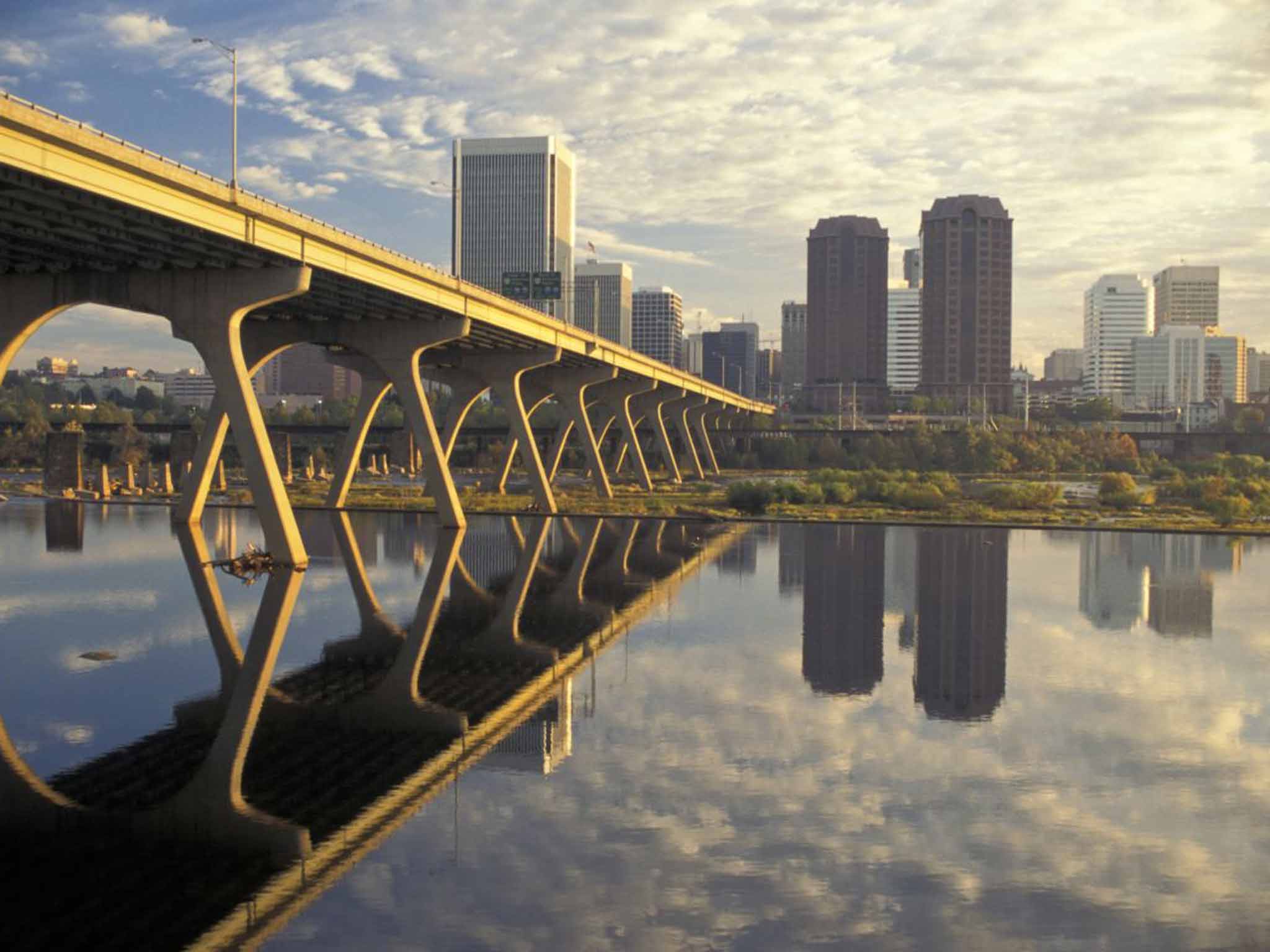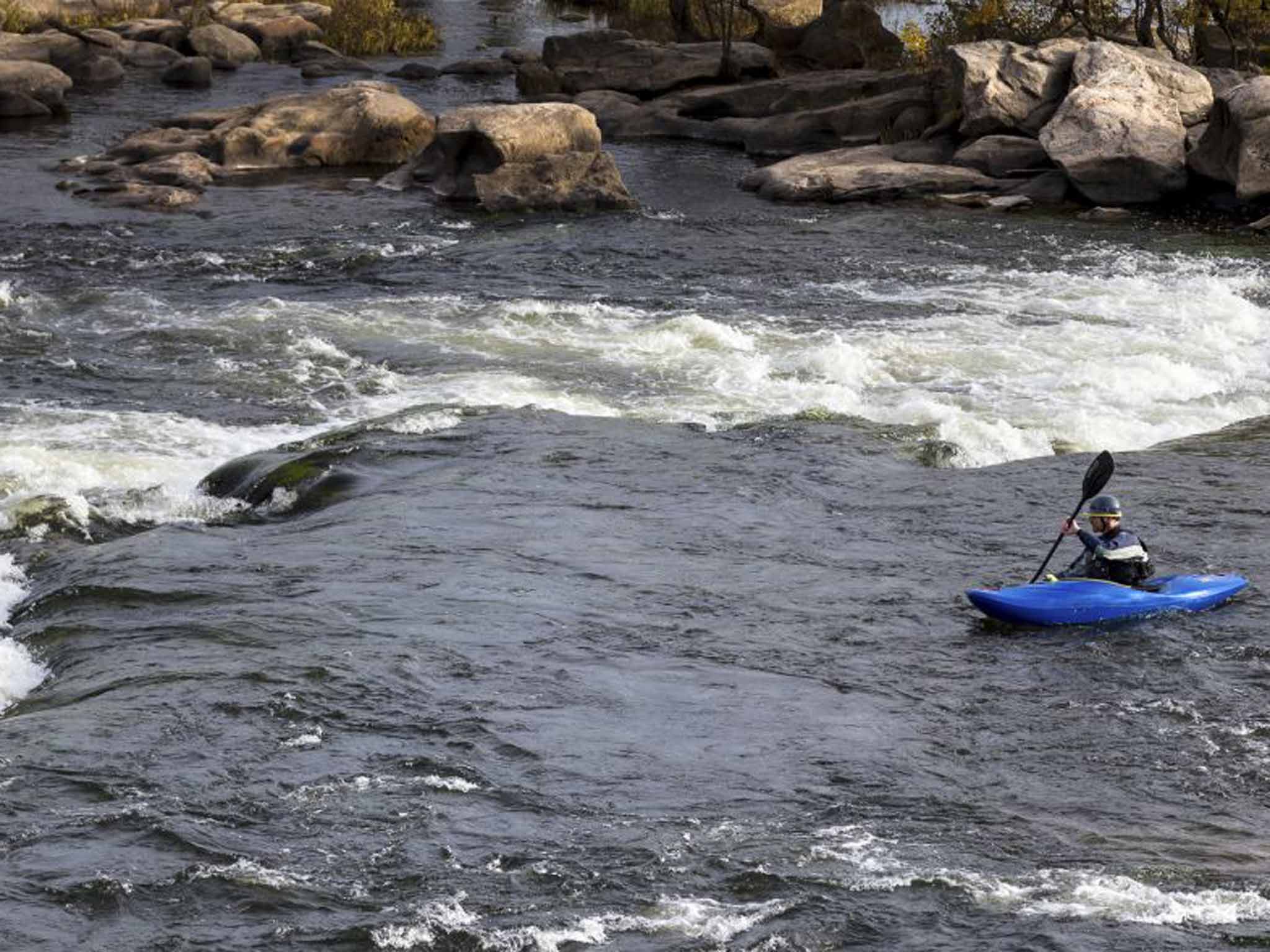Richmond, Virginia: Beyond the American Civil War
The state capital brims with history, but it also has Grade IV white water rapids

Your support helps us to tell the story
From reproductive rights to climate change to Big Tech, The Independent is on the ground when the story is developing. Whether it's investigating the financials of Elon Musk's pro-Trump PAC or producing our latest documentary, 'The A Word', which shines a light on the American women fighting for reproductive rights, we know how important it is to parse out the facts from the messaging.
At such a critical moment in US history, we need reporters on the ground. Your donation allows us to keep sending journalists to speak to both sides of the story.
The Independent is trusted by Americans across the entire political spectrum. And unlike many other quality news outlets, we choose not to lock Americans out of our reporting and analysis with paywalls. We believe quality journalism should be available to everyone, paid for by those who can afford it.
Your support makes all the difference.At the former Tredegar Ironworks, a reconstructed water wheel turns, a remnant of Richmond's somewhat chequered past. Tredegar was where much of the Confederate weaponry was produced during the American Civil War, and although that ended exactly 150 years ago, Richmond is brimming with reminders of it. The capital of Virginia became the capital of the Confederate States for the vast bulk of the war, only to be burned and evacuated a week before the climactic surrender at Appomattox.
Richmond Battlefield National Park (001 804 226 1981; nps.gov/rich) has its main visitor centre inside Tredegar, with a strong focus on the battles that shaped proceedings. It also does a good job of showing how the city was in many ways the antithesis of the southern stereotype – industrial urbanity rather than sprawling plantations.
But this month, Richmond will be more about bicycle wheels than water wheels. From 19 to 27 September the city will host the UCI Road World Championships (richmond 2015.com), where top cyclists including Britain's Mark Cavendish will compete for medals.
Featured heavily in the courses will be Monument Avenue; if ever a road summed up the good and bad about Richmond, this is it. The architecture is impeccably dreamy. But the monuments are on the wrong side of history. Grand, lionising visions of Confederate President Jefferson Davis, plus generals Robert E Lee, Jeb Stuart and Stonewall Jackson, feel out of time and tonally indefensible. The motley collection of statues devoted to slave-owners and segregation fanatics outside the State Capitol building (001 804 698 1788; virginiacapitol.gov) also feel like they're part of the conversation that America needs to have.

The strangest thing is how unrepresentative such throwbacks are. Venture beyond the downtown area, and Richmond feels both lively and rather liberal. The Shockoe Bottom and Church Hill areas to the east pack in multi-cultural energy and excellent food. The university area to the west, and the Carytown shopping district beyond are all grand buildings, brunch terraces and pleasingly individual enterprises. And if that feels like a bit of the North in the South, then the James river brings in the West's great outdoors. Richmond proudly boasts that it's the only city in the US with Grade IV white water rapids.
Unpack
The Jefferson Hotel (001 804 649 4750; jeffersonhotel.com) occupies an entire block and is among America's grandest of dames. Opened in 1895 but currently, the lavishings of richly decorated Renaissance-style marble columns are actually an illusion (it's meticulously-painted concrete). But the wow factor is undeniable, and locals make a beeline there for OTT Sunday brunch and afternoon tea. An on-the-quiet two year refurbishment programme, which should finish in January 2016, has seen the rooms get a sensitive modernisation. Doubles from $312 (£208).
Think local
Given Richmond's history as an industrial hub, and the fact that most of the industry was built along the James River, you might expect the river itself to be pretty grim. Wrong – it's wild and scenic. Locals turn little mudbanks and islets into impromptu beaches in summer, while rapids and the remains of bridges destroyed at the end of the Civil War make it marvellously picturesque. Hire a kayak or paddleboard from Riverside Outfitters (001 804 560 0068; riversideoutfitters.net; $15/£10 an hour) on Brown Island, or head out on a rafting trip with River City Adventures (001 804 233 4000; rivercityadventure.com; $60/£40pp).
Eat
Earlier this year, long-standing nouveau-Southern cuisine favourite Julep's (001 804 377 3968; juleps.net) moved from Shockoe Bottom to East Grace Street, which is emerging as a downtown restaurant strip. Replacing it is Shockoe Whiskey and Wine (001 804 771 1711; shockoewhiskeyandwine.com), where adroitly-spiced Southern-fried whole red snapper with pineapple salsa ($28/£19), and sinfully superb bourbon-glazed meatballs ($12/£8) are among the offerings.
Drink
Grandstaff & Stein (001 804 918 2627; booksellersva.com) opened in the spring, and is gradually pulling in cocktail enthusiasts who have cottoned on that it's not a bookshop. The wall of stacked shelves at the entrance of this Shockoe Bottom speakeasy disguises a door to a darkened bar, with a little outdoor courtyard as a bonus. Get chatting to the barman and he'll happily go off-menu.
Spend
Carytown – basically Cary Street, to the west of the main Virginia Commonwealth University campus – is rampantly varied. For The Love Of Chocolate (001 804 359 5645; love-choc.com) is about bunny-boilerish obsession rather than simple love. Huge cabinets of truffles and cookies are dwarfed by the shelving that pulls together bars from gourmet chocolatiers across the US and beyond.
Don't miss
The American Civil War Center (001 804 649 1861; acwm.org; $8/£5.20) inside the former gun foundry at Tredegar is due to undergo an expansion next year. The museum acts as an absorbing timeline of the tensions leading up to the war, before going into just the right level of detail on how it panned out. Events, reasonings, and aftermath are looked at from Union, Confederate, and African-American perspectives, but there's no fudging the fact that the war was primarily about slavery. For non-historians, there are a lot of "I didn't know that" moments.
Getting there
Fly with United (020 7136 0582; united.com) from a range of UK airports to Richmond via Washington Dulles or Newark. It’s arguably simpler, and almost always cheaper, to fly non-stop to Washington from Heathrow or Manchester on United; Virgin Atlantic (0344 209 7777; virginatlantic.com) and British Airways (0844 493 0787; ba.com) also fly non-stop from Heathrow to Washington Dulles. From there, rent a car; the drive to Richmond takes around two hours and 15 minutes.
More information
Join our commenting forum
Join thought-provoking conversations, follow other Independent readers and see their replies
Comments